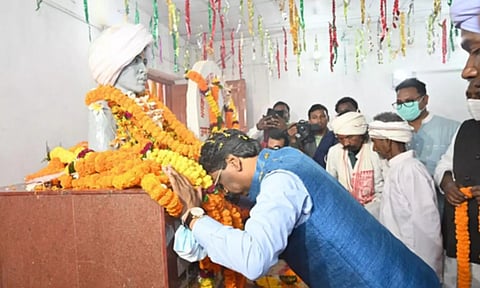

RANCHI: Jharkhand, which came into existence on November 15, 2000 as the 28th state of the country, has a special reason to celebrate its Foundation Day on the given date. November 15 is also the date when Birsa Munda, the tribal icon of the Indian freedom struggle, was born.
People in Jharkhand know him as ‘Dharti Aaba’ i.e. Father of the Earth and Lord Birsa Munda. ‘God’ or ‘Dharti Aaba’ is not a title given to anyone, but the truth is that Birsa Munda is worshiped here with religious beliefs.
The then Atal Bihari Vajpayee government at the Center chose his birth anniversary as the date of birth of this state, respecting the faith towards Birsa Munda.
Now Birsa Munda has become the symbol of Jharkhand’s identity. In 2022, the central government notified Birsa Munda's birth anniversary as Tribal Pride Day and on this day, the several government-non-government events across the country are organised to mark his birth anniversary.
When the Jharkhand Government officially celebrates the State Foundation Day on November 15 every year, it starts with the laying of wreaths and prayers by the Governor and the Chief Minister at the Samadhi of Birsa Munda.
Whenever the President, PM or any special guest comes to Jharkhand, their address starts with salutation to Birsa Munda. The visitors in the state are also greeted with the line: ‘Welcome to the land of Lord Birsa Munda!’
Birsa Munda was martyred on June 9, 1900 in the fight against the British, but his heroism came into the limelight in front of the country and the world when IAS officers Dr. Kumar Suresh Singh, who was posted on various administrative posts in Jharkhand, visited tribal areas. After years of research and long study of tribal culture, he wrote a book in 1966 on Birsa Munda's struggles, his life titled ‘The Dust-Storm and the Hanging Mist’.
The book was later published in Hindi in 2003 by Vani Prakashan as ‘Birasa Munda Aur Unka Aandolan’, which describes Munda's struggle against the British till 1901 in Chhotanagpur area.
After Kumar Suresh Singh's book, the state government also accepted his incomparable contribution and his statues were installed in undivided Bihar and chowks and intersections were named after him.
A chowk in Ranchi was named Birsa Chowk before the entrance of the public sector undertaking HEC (Heavy Engineering Corporation) in Ranchi and his statue was installed here. Earlier this statue was tied with shackles, but later its shackles were removed.
After this, the name of Ranchi Airport was also changed to Birsa Munda Airport. Not only this, the old jail of Ranchi was also renamed as Birsa Munda Jail and a grand statue of him was installed here. Birsa Munda took his last breath in this jail.
Jharkhand government has launched about a dozen schemes in the name of Birsa Munda like Birsa Harit Gram Yojana, Birsa Munda Technical Scholarship Scheme, Birsa Munda Horticulture Scheme, Birsa Awas Yojana, etc.
Birsa Munda Scholarship Scheme was started in 2001 by the Government of Jharkhand. Its purpose is to provide financial help to tribal children pursuing technical education (engineering and medical). The current state government led by Hemant Soren had launched the Birsa Harit Gram Yojana in 2020. Its objective is to increase the income of the farmers in their area.
Renowned writer and director of Jharkhand Government's Tribal Research Institute, Ranendra Kumar says, “Birsa Munda is remembered not only for the revolution against the British, but also he has been known as the Messiah for the socio-religious impact of tribal life.
No history can be written in Jharkhand by separating Birsa Munda. He is such a great man, who is established in the life of the people here. Politically, this is also the basis for considering him as the symbol of Jharkhand.